|
|
| 'Like' us on Facebook | Follow us: |
Posted on: Oct 21, 2013
MUSINGS ON THE GITA – 06
Prof. G. Venkataraman
The Bhagawad Gita was delivered by Lord Krishna to the warrior prince Arjuna on the battlefield of Kurukshetra as an antidote to the dilemma that arose in him. It was not a choice between right and wrong, rather it was dilemma between the 'apparently' right and 'absolutely' right. Five thousand-odd years later the wisdom of the Gita is still not lost in context in modern times. In fact it is more relevant and needed now than ever.
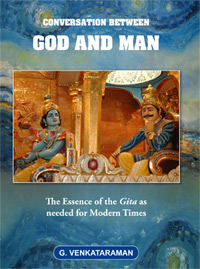 |
No wonder then that when the Lord incarnated again as Bhagawan Sri Sathya Sai Baba He did not fail to emphasise the importance of this spiritual treatise. Apart from giving us an entire volume of commentary on the Bhagawad Gita in the Gita Vahini, Baba also has delivered a number of discourses on this classic text. For instance, during August–September 1984, Baba gave a series of 34 discourses on The Bhagawad Gita inside the Bhajan Hall in Prasanthi Nilayam (these have been aired on Radio Sai several times).
This musing series by Prof. G. Venkataraman is on the 'Essence of the Gita'. In this modern age of rationalism we tend to refuse to accept anything that is not offered on the platter of scientific approach. And that is what makes this presentation by an eminent scientist a work of unquestionable relevance. He has infact authored a comprehensive book on the Gita: Conversation Between God and Man, which is popular as much for its profundity as its lucid and simple-to-understand conversational style.
The current series of articles is actually an adaptation of a radio series that was produced and aired on Radio Sai on the request of our listeners. In these episodes too Prof. G. Venkataraman has dealt with the teachings of the Gita in a practical, scientific and thematic manner which makes for interesting reading and easy understanding.
CHAPTER 6 OF THE GITA
AND MIND AND SENSE CONTROL
At the outset, I offer my humble pranams to Swami and express my gratitude to Him for guiding thus far. I seek His grace and blessings to navigate through the difficult topic I intend to cover today.
We think of Prasanthi Nilayam as an ashram in a village called Puttaparthi. In a purely geographical sense that perhaps holds true. But what Swami wants is our Heart and Mind to be the abode of Peace or Shanti so that the whole world transforms into Prasanthi Nilayam. It is help us transform the world in that manner that He came donning the human form, and it is in this context that He is teaching us all the time about Mama Dharma, which He taught earlier as Lord Sri Krishna. So we resume our explorations of the Mama Dharma aspects of the Gita, taking a brief look into Chapter 6 this time.
Before I start on that, let me remind you briefly of the ground we have covered thus far:
Thus Far in the Gita Series
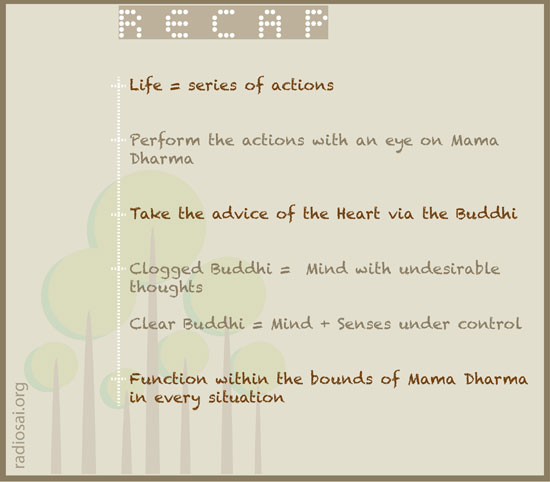 |
I started out by drawing your attention to the fact that adhering to Mama Dharma is the essential or the core message of the Gita.
I then led on to the Second and later Chapters of the Gita and while dealing with them, I pointed out the following facts.
a) Life is a series of actions.
b) Actions must always be performed with an eye on Mama Dharma.
c) In this matter, we need the advice of the Heart, which is conveyed to us via a pipeline called Buddhi.
d) The pipeline called Buddhi can easily become clogged if the Mind is allowed to be full of undesirable thoughts. So to keep Buddhi in shape, sense and Mind control are essential.
e) One does not have to withdraw into the forest and become a recluse in order to do all this. In fact, Krishna wants us to be very much in the situation we are placed in by Destiny and function within the bounds of Mama Dharma in that situation.
Along the line, I also drew attention to the importance of Mind and sense control.
Chapter 6 – Dhyana Yoga
Turning now to Chapter 6, it is entitled Dhyana Yoga, meaning, the Path to God via Meditation. There are three questions that arise in this context. They are:
1) What exactly is meant by Meditation?
2) Why Meditation?
3) What characterises a person who meditates intensely?
These questions are important and need some examination. In the phrase Dhyana Yoga, there are two words, Yoga and Dhyana. Yoga is often confused with physical exercises called Yogasanas, while Dhyana is sometimes reduced to an exercise in stress relaxation. Yes, the formal discipline of Dhyana Yoga does call for the practice of Yogasanas and mental relaxation; but these are only starters. The real objective of Dhyana Yoga is different. It is because not enough attention is given to the real objective that some have been able to skilfully market Meditation and Yoga. In fact, these days Meditation has become almost an industry and a fashion, especially where the Corporate sector is concerned.
As I have been constantly stressing, the Gita is all about adhering to Mama Dharma. And for that, sense and Mind control are a vital pre-requisite; Chapter 6 which is the theme of this talk, is in a sense all about Mind and sense control. Many questions arise such as:
-
What is this Mind we are talking about?
-
What is the relationship of this so-called Mind to the senses?
-
Why on earth should we exert to achieve this control?
-
Suppose we do control the Mind and the senses, then what? Are there any fallouts, and are there any benefits?
The Mind and Its Mysteries
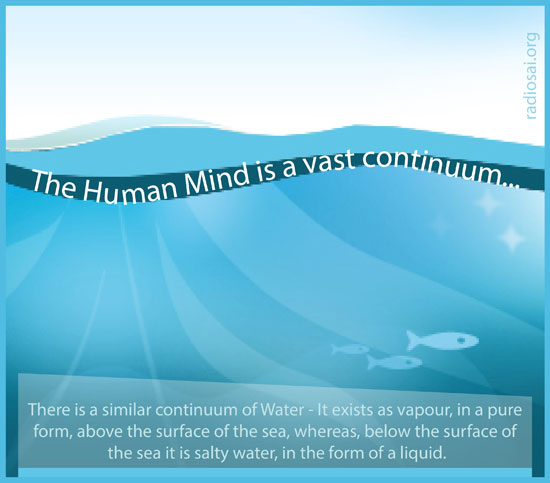 |
I would now like to briefly deal with these questions before I get into Chapter 6. Let me start with the Mind. This is a word we frequently use; in an intuitive way, we all understand or think we understand what this word Mind means. But do we really? I don’t think so, and so it is better we pause for a second to try and understand what we mean by this word. To appreciate the full meaning, it is useful to consider an analogy.
Let us consider the sea and start with say the bottom. What we have there is lots and lots of salt water, with fish swimming around. Let us now go up until we come to the surface. There we would see waves, rising and crashing. Some waves would be big while others would be small. The water in the waves also is salty just as the water at the bottom, though the waves have a different form as compared to the waters below where there are no waves. Just above the waves, we have foam and above that salt spray. Some distance above the foam, the water exists in the air as small droplets and water vapour. The droplets are salty, while the water vapour, having come through evaporation is pure water. If we keep ascending into the atmosphere and go way up, we would not find any droplet, naturally; however, there would be water vapour for sure, having originated through evaporation. This vapour is in a gaseous state as opposed to the water which exists in the liquid state in the sea. The water vapour is pure H2O – no salt.
What this example teaches us that there is a continuum of water, with water existing as vapour and in a pure form way above the surface of the sea, as opposed to water existing as liquid water and with a lot of salt in it, way down below the surface of the sea. I have made a particular reference to this example because what we call the Mind is a similar continuum. Unless we understand that extensive nature of the Mind, we cannot really grasp what Mind and sense control are all about.
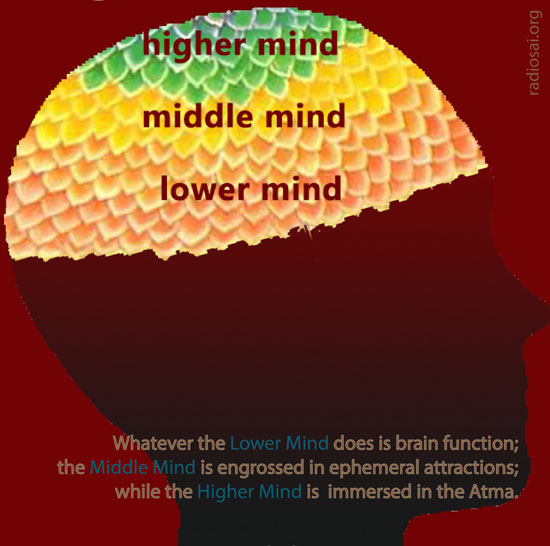 |
May be all this is a bit puzzling, to say the least; so let me explain. You see, as I just said, the human Mind is a vast continuum. At one end, whatever the Mind does is just brain function; at this end, the Mind is strongly integrated with the body. Way at the other end, the Mind is far removed from the body, because it is immersed in the Atma. The Middle Mind is looking here and there. As Swami says, it is like a crow, which has the habit of looking in one direction for a short while and then looks the other way; it keeps on flitting all the while. The Middle Mind is all the time looking into the world and following all sorts of ephemeral attractions. This would not do, if one is serious about Mama Dharma. If we want to make Mama Dharma the main objective of life, and that is what we really ought to do – that is what the Gita recommends anyway – then we have to rise above the Lower and the Middle Mind. That is what Mind and sense control is all about really.
Understanding Yoga
With that background, I am now set to introduce you to some key Slokas in Chapter 6. We have first a Sloka that extols the virtue of renunciation. The Lord says:
-
Know that to be Yoga, O Pandava, which is called renunciation; for none can become a Yogi without renouncing the pursuit of desires. [6.2]
What exactly is Yoga? That the Lord clarifies as follows:
-
When a man is not attached to the sense objects or to action, and in addition has shed all desires, then alone is he said to have ascended to Yoga. [6.4]
 |
This is an important point, and the Lord adds the following. Please follow it carefully
-
Man should subjugate his Mind to the Self and not degrade himself by letting the Mind become the slave of the [lower] self; the Mind can thus be a friend or a foe. [6.5]
-
For him who has conquered the [lower] self by the [Higher] Self [i.e., the Mind by the Atma], his Mind is a friend; but for him whose Mind is not responsive to the Self, the Mind becomes an enemy. [6.6]
 |
I am sure you have heard Swami say many times that the Mind can be a foe as well as a friend. In fact, Swami gives a nice analogy. He says the Mind is like a key and the Heart is like a lock. If the key is turned one way, the lock opens; if it is turned the other way, the lock gets closed; that same thing was told by Swami to Arjuna five thousand years in slightly different language, as I have just pointed out.
Who is a Yogi?
What is the signature of a man who has renounced and turned his Mind completely towards God? The Lord explains.
-
The serene man, having subdued his Mind and become absorbed in the Self, is steadfast in the midst of pairs of opposites such as cold and heat, pleasure and pain, as also honour and ignominy. [6.7]
-
That man is a true Yogi who is content with wisdom and discrimination, who remains unshaken, who has conquered his senses and to whom clay, stone and gold are alike. [6.8]
-
He stands supreme who regards alike friends, enemies, neutrals, arbiters, the hateful, kinsfolk as also saints and sinners. [6.9]
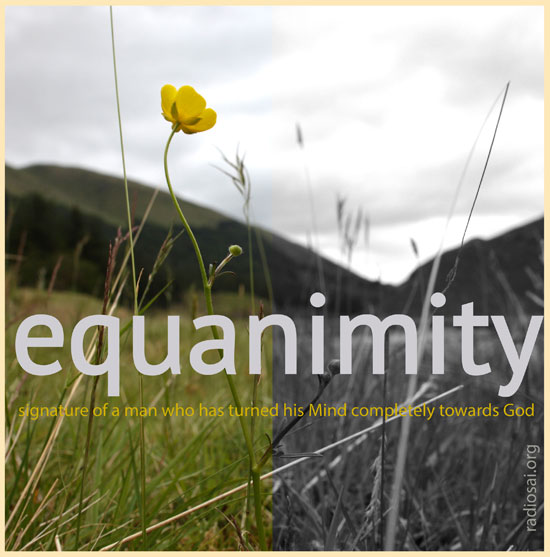 |
So you see, it is important to develop equanimity; no doubt corporate managers are all the time asked to develop this quality, but the Lord made clear five thousand years ago, that equanimity is even more important for one who is serious about following the spiritual path.
One might argue that all this advice is fine as textbook material but impractical. In fact, Arjuna himself raised such doubts. Yes, tough it is, but not impossible. That is what the Lord asserts in the following set of Slokas.
-
This [state of] severance from the misery of affliction and pain is known as Yoga, and should be practiced with determination and an undistracted Mind. [6.23]
And now for some golden rules concerning the discipline that must be adopted to achieve renunciation, detachment, equanimity, etc.
-
Completely renouncing all desires arising from thoughts of the world, and fully curbing the Mind by all senses;
-
Let him [the aspirant] little by little, his reason controlled by fortitude, attain peace; and, fixing his Mind on the Self, let him think of nothing else. [6.24 &25]
The Lord continues:
-
Restraining the restless and fidgety Mind from wandering, he should subjugate it solely to the Self. [6.26]
 |
The Beautiful Benefit of Yoga
What happens when one subjects oneself to such a tight discipline? The Lord reveals:
-
Verily comes Supreme Bliss to that Yogi whose Mind is calm, whose passion is subdued, who is sinless and who has become one with Brahman. [6.27]
-
Thus, transcending sin, abiding always in the Eternal, the Yogi attains with ease the Infinite Bliss that flows from Brahman. [6.28]
-
His Mind harmonised by Yoga, he sees himself in all beings and all beings in himself; he sees the same in all. [6.29]
-
He who sees Me in everything and everything in Me, him I shall never forsake, nor shall he lose Me. [6.30]
-
He who established in oneness, worships Me as abiding in all beings, always lives in Me, whatever he does. [6.31]
-
And of all Yogis, he who worships Me with faith, with his Mind concentrated upon Me, him I consider to be the best. [6.47]
 |
Those are the fallouts of steadfastness and immersing the Mind in God rather than in the ephemeral world. You would notice that this is another way of saying, “O man, focus on the permanent rather than the transient. And that requires Mind and sense control.”
I hope what I have said thus far would make you appreciate that following the spiritual path is not a matter to be treated casually. I have to stress this because these days, people tend to live at such a fast pace that they are totally oblivious to the need for keeping some time for themselves for deep introspection and meditation.
Swami on Mind
I do not want you think that all that I have said about the Mind and the traps it lays are my own speculations. Swami Himself has spoken about the Mind on several occasions, and here is a sample of quotes from some of His observations. Commenting on how little we know about the Mind, Swami says:
Laymen glibly talk about the Mind, without knowing what exactly the form and shape of the Mind is. Words like Mind, happiness and Bliss are abstractions which do not have existence in space and time. Nevertheless, they do subsist in a special sense. Though they do not exist in form, none can deny the fact they are real, individual experiences.
The Mind is not an organ or a part of the body; it transcends the body. It is associated with Universal Consciousness. Men are accustomed to treat the Mind as a part of the body. This relates only to the sensory activities of the Mind. The Mind is made up of thoughts and doubts. But the Mind associated with the Divine Atma transcends the body. Consequently, it is only when the ordinary thought processes are extinguished that the Divinity within can be experienced. The Consciousness that goes beyond thought is a reflection of the Atma.
Drawing attention to the power of the Mind, Swami says:
Man is not aware of the potentialities of the Mind. The Mind is the cause of all our sorrows and joys. The powers of the Mind are indescribable. In one moment it can encompass the Universe. In another moment, it can be a total blank. It can blossom in one moment and wither in the next. The Mind is the cause of both good and bad.
Elsewhere Swami says:
Mind is a sharp sword. Man will be able to fulfil himself if he realises the subtle and mysterious workings of the Mind. Mind travels fast, is strong, lighter than ether, and subtler than electricity. Man becomes an easy prey to sorrow and suffering by directing the Mind on questionable paths.
Let me briefly return at this point to three questions that I posed in the beginning:
1) What exactly is meant by Meditation?
2) Why Meditation? And,
3) What characterises a person who meditates intensely?
Summarising Chapter 6
Based on the Slokas that I have quoted, one can give the following brief answers to the above questions:
-
Meditation means placing one’s Mind entirely in God.
-
Meditation is required, because without placing our Mind in God, we would go astray in our actions.
-
A man who meditates intensely is ever calm and unruffled; he is characterised by equanimity.
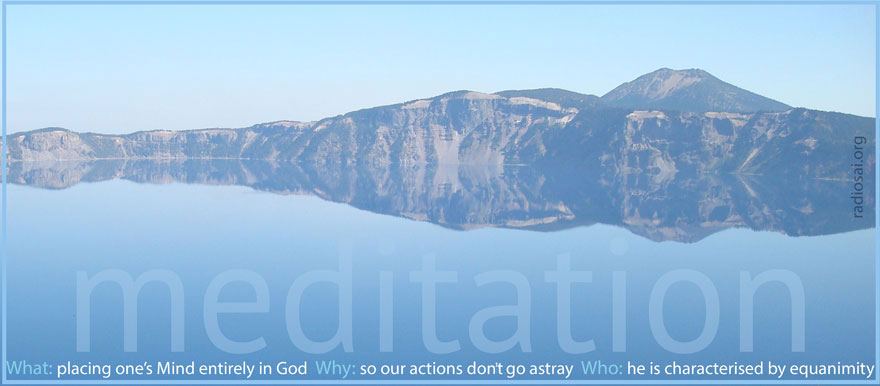 |
To wrap it all up, yes, Mama Dharma is what the Gita boils down to. However, in practice, adhering to Mama Dharma means we must subject ourselves to a certain discipline. And that discipline, among other things, calls for Mind and sense control.
The question might be asked: “Why on earth must we follow Mama Dharma?” That question would soon receive detailed attention.
In brief, basically it has got to do with the fact that each one of us is a part of the Cosmos, which is Manifest Divinity. If Divinity is in every atom of the Cosmos, it follows it is immanent in each of us too. And if Divinity is immanent in each of us, it had better show up in the way we live. Surely we cannot afford to be Divine at the core and allow our Mind and senses to make us live like animals or devils, can we? And yet, is it often not the way people live today? How else did the much-talked about global warming problem crop up suddenly? Is it not due to the extensive air pollution caused by man? Does polluting the air God has given us so that we may live, constitute being in harmony with Nature? Is it not our duty to be in harmony with Nature? Is it not our duty to follow Mama Dharma?
Think about it!
Jai Sai Ram.
What are your impressions about this article? Please share your feedback by writing to h2h@radiosai.org. Do not forget to mention your name and country.











